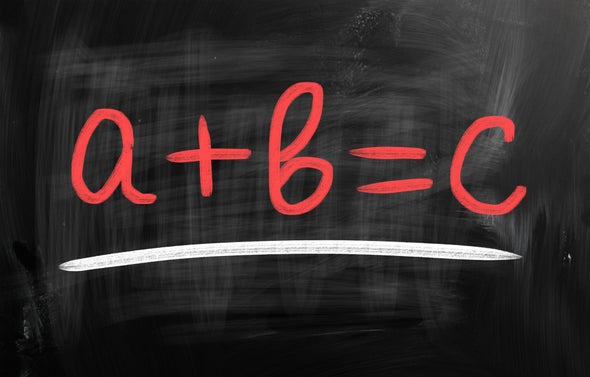The founder of a Japanese media company has offered a large cash prize to anyone who can find a flaw in an unusual proof
Thank you for reading this post, don't forget to subscribe!
At first glance, the abc conjecture seems innocuous. It deals with two natural numbers, a and b, and their sum, a + b = c. As is common in number theory, the conjecture deals with prime numbers that exactly divide a given number—what mathematicians call prime divisors. Any number can be represented as a product of prime numbers—for instance, 15 = 3 x 5 or 324 = 22 x 34. The latter is an example of a “rich” number because it has many equal prime divisors (the 2 occurs twice, and the 3 occurs four times). Such rich numbers are rare. Even more rarely, the sum of two rich numbers is rich again. This unusual occurrence is what the abc conjecture, which mathematicians Joseph Oesterlé and David Masser formulated in 1985, is all about. The conjecture gives a kind of measure of how “rich” the sum of two numbers can be. The special thing about the conjecture is that it combines the additive and multiplicative properties of natural numbers.
[Read more about the search for prime numbers]
Because the equation a + b = c is so simple, many other problems are related to it. For example, Fermat’s last theorem, which deals with solutions of the form an + bn = cn, has puzzled experts for more than 350 years. In the mid-1990s mathematician Andrew Wiles was able to prove that if n > 2, this simple equation has no integer solutions for a, b or c. But if the abc conjecture is true, Fermat’s theorem is more easily explained. The conjecture would also settle some open questions in number theory and could become an important tool in the field—especially when combined with the concept of elliptic curves.
A Mistake in a 500-Page Proof?
It’s no surprise then that quite a few number theorists pounced on Mochizuki’s promising work after its publication. The Japanese mathematician had already achieved significant accomplishments. But his “inter-universal Teichmüller theory” (IUT), which is supposed to confirm the abc conjecture, is filled with pages and pages of definitions and theorems whose proofs often simply read, “The proof follows from the definition.” This unusual style continues for a total of about 500 pages, which are based on another 500 pages of past work by Mochizuki. And the mathematician did not make anything easy for his colleagues: he has refused to present his results abroad, so several conferences on the subject have been held without him.
In 2018 things finally came to a head when mathematician Peter Scholze and his colleague Jakob Stix published the paper “Why ABC Is Still a Conjecture.” In it, they claimed to have found a “severe” problem in the proof by Mochizuki. Scholze and Stix even traveled to Japan to discuss it with Mochizuki. But the three experts could not come to a common understanding. The ambiguities in the proof remained open for Stix and Scholze, while Mochizuki claimed that his two colleagues were equating objects that were in fact different and therefore drawing incorrect conclusions.
Further controversy arose in 2021 when Mochizuki’s proof appeared in a revised form in the journal Publications of the Research Institute for Mathematical Sciences, of which Mochizuki himself is editor in chief. This move is not in itself unusual: mathematicians often publish their work in journals where they serve as editors. The important thing is that these scholars are not involved in the peer review of their own work. Scholze, however, insists that the evidence is still incomplete, in his view.
Million-Dollar Motivation
So despite Mochizuki’s latest publication, most number theorists cannot follow the proof. And although Mochizuki has an excellent reputation, consensus in the field suggests his arguments do not prove the abc conjecture, meaning the puzzle of a + b = c remains open.*
To eliminate this uncertainty, Kawakami, founder of DWANGO, has now taken an initiative. While he is not a mathematician himself, he sees IUT theory as an important contribution to the field, New Scientist recently reported. In June 2023 Kawakami announced plans to award $20,000 to $100,000 annually over the next decade to a paper that makes significant advances in Mochizuki’s IUT theory. The paper will be chosen by a group of experts on IUT theory, and the first distribution is scheduled to take place in 2024.
If, on the other hand, someone finds a serious flaw in the theory, that person will receive $1 million. Kawakami will decide for himself which peer-reviewed publication will receive this award. He is offering this prize money in order to motivate more people to do research in this field, he explained in a recent press conference. Mathematician Fumiharu Kato told New Scientist that, by his estimate, fewer than 10 people in the world are well versed in IUT theory. It therefore remains to be seen whether Kawakami’s efforts will ever bear fruit and the abc conjecture will be settled.
This article originally appeared in Spektrum der Wissenschaft and was reproduced with permission.
*Editor’s Note (7/31/23): This paragraph was edited after posting to clarify that although there are supporters of Shinichi Mochizuki’s proposed proof of the abc conjecture, a majority of number theorists believe the conjecture remains unproved.
ABOUT THE AUTHOR(S)

Manon Bischoff is a theoretical physicist and editor at Spektrum, a partner publication of Scientific American. Credit: Nick Higgins

